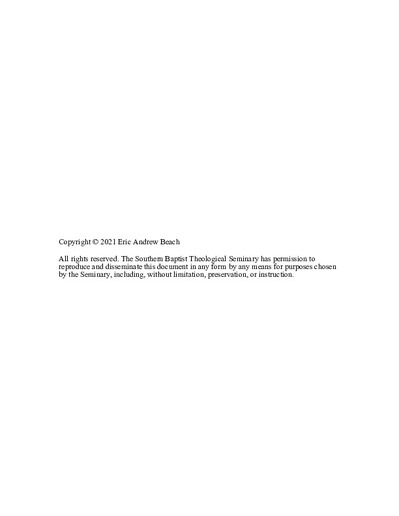| dc.contributor.advisor | Wilsey, John D. | |
| dc.contributor.author | Beach, Eric | |
| dc.date.accessioned | 2022-05-31T20:28:37Z | |
| dc.date.available | 2022-05-31T20:28:37Z | |
| dc.date.issued | 2021-04-15 | |
| dc.identifier.uri | https://hdl.handle.net/10392/6771 | |
| dc.description | This work is embargoed by the author until 09/02/2023. | |
| dc.description.abstract | While historians disagree about many different aspects of the Westminster Assembly (1643–1653), the current historiography is united in seeing the gathering and its members as staunchly anti-Catholic. However, a largely overlooked debate in the Assembly reveals a surprising discussion—some divines showed sympathy with the distinctly Roman Catholic doctrine of consilia evangelica that undergirded works of supererogation and that had been condemned by the magisterial reformers. A careful reading of the Assembly minutes shows that views on consilia correlated with the positions of some Assembly divines on critical issues such as salvation and good works. The debate over consilia at Westminster is the tip of an iceberg capable of yielding fresh and unexpected insights into three important and interconnected fields of historiography: (1) the place of consilia amongst Protestantism, (2) the reach of Roman Catholicism within the Assembly, and (3) the extent of Roman Catholic influence in English Puritanism. | en_US |
| dc.subject.lcsh | Westminster Assembly (1643-1652) | |
| dc.subject.lcsh | Church of England--Relations--Catholic Church | en_US |
| dc.subject.lcsh | Consilia | en_US |
| dc.title | Consilia: Catholic Inroads at the Puritan Anti-Catholic Westminster Assembly | en_US |
| dc.type | Electronic thesis | en_US |
| dc.type | Text | |
| dc.embargo.liftdate | 2023-09-02T00:00:00Z | |
| dc.type.qualificationname | Th.M. | en_US |
| dc.publisher.institution | Southern Baptist Theological Seminary | en_US |
| dc.publisher.department | School of Theology | |

